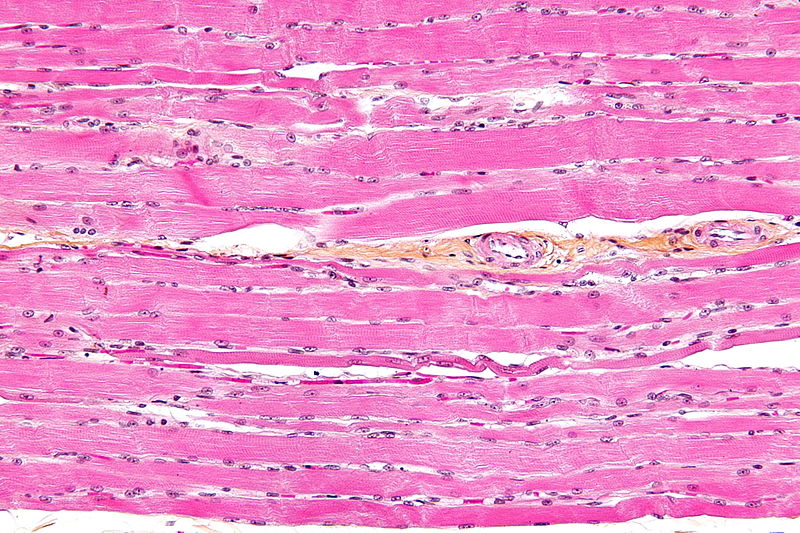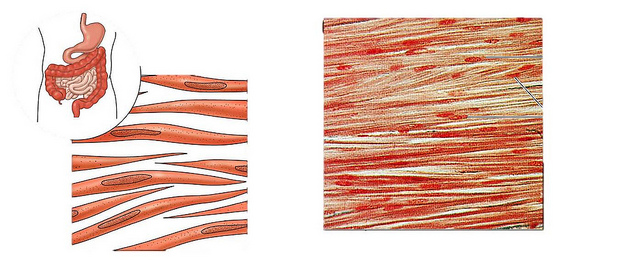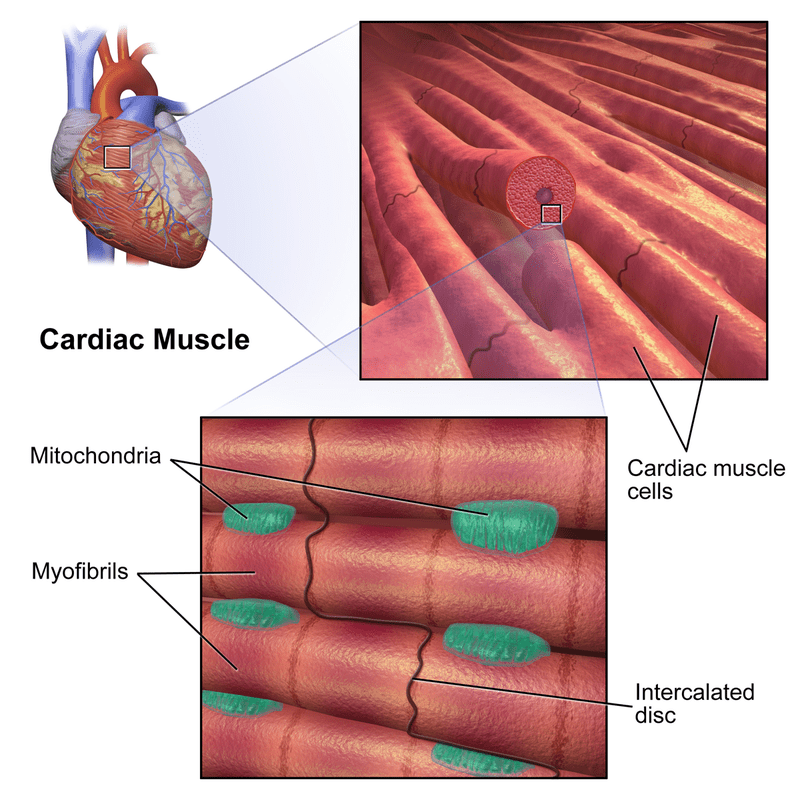Difference Between Striated Non Striated and Cardiac Muscles
Table of Contents
Key Difference – Striated vs Non Striated vs Cardiac Muscles
The muscle tissue tissue is an important tissue in locomotion and movement. According to the physiological function and location of the muscle, muscles are divided into three types, namely striated, non – striated and cardiac muscle. Striated muscles are the muscles that have cross striations and are mostly found attached to tendons or bones. Non striated muscles are the type of muscles that do not show any cross striations. They mostly are situated in the lining of inner organs and show involuntary movement. Cardiac muscles are a special type tissue that is lining the heart. They also a type of a striated tissue. The key difference between three types of muscles is that the location where the muscle type resides. Striated muscles that are also referred to as skeletal muscles are attached to bones or tendons, non striated muscles form the lining of the hollow viscera whereas the cardiac muscle forms the lining of the heart.
CONTENTS
1. Overview and Key Difference
2. What are Striated Muscles
3. What are Non Striated Muscles
4. What are Cardiac Muscles
5. Similarities Between Striated Non Striated and Cardiac Muscles
6. Side by Side Comparison – Striated vs Non Striated vs Cardiac Muscles in Tabular Form
7. Summary
What are Striated Muscles?
Striated muscles also referred to as skeletal muscles. They are found attached to bones and tendons. Striated muscles show voluntary actions and they are mostly elongated in shape.

Figure 01: Striated Muscles
The striated muscles have blunt ends. These muscles have a prominent sarcoplasmic reticulum and the well-developed sarcomere. The ultrastructure of the sarcomere is modified for muscle contraction movements and contains two main types of fibers; actin and myosin. These fibers contract and relax alternatively to facilitate muscle movements. Striated muscles are myogenic and show voluntary, fast, rapid movements. These properties of the striated muscles increase the efficiency of the muscle contraction and relaxation process. Striated muscles, therefore, get fatigue easily.
What are Non Striated Muscles?
Non striated muscles are also referred to as smooth muscles. These muscles are found in the lining of the hollow viscera around internal organs such as stomach, esophagus, lungs and the intestines. They are spindle-shaped and lack cross striations.

Figure 02: Non-Striated Muscle
Non striated muscles show tapering ends and lack fibers. The non – striated muscles do not have a well – developed sarcoplasmic reticulum or a sarcomere as it is not involved in complex rapid movements. Non striated muscles show involuntary movements and are neurogenic. They show prolong movements and do not get fatigued easily.
What are Cardiac Muscles?
Cardiac muscle is a specialized type of striated muscle which is only found in the lining of the heart. They show similar characteristics to striated muscles. The cardiac muscles are striated, uni-nucleated, branched and are short cylindrical. The most prominent feature of the cardiac muscle is the presence of intercalated discs.

Figure 03: Cardiac Muscle
Cardiac muscles are also involuntary in their action and are myogenic. The cardiac muscle never gets fatigue until death. They show slow, rhythmic contraction patterns. Cardiac muscles also possess a prominent sarcomere and a sarcoplasmic reticulum which aid in the contraction process of the heart. This facilitates the pumping mechanism of the heart.
What are the Similarities Between Striated Non Striated and Cardiac Muscles?
- All three types have a specific shape and are characterized based on the location, structure, and physiology of the muscle.
- All three types of muscles have structural and functional importance in our body.
What is the Difference Between Striated Non Striated and Cardiac Muscles?
Striated vs Non Striated vs Cardiac Muscles | |
| Striated Muscles | Striated muscles are the muscles that have cross striations and are mostly attached to tendons or bones. |
| Non Striated Muscles | Non striated muscles are the type of muscles which do not show any cross striations. They are mostly situated in the lining of inner organs and show involuntary movement. |
| Cardiac Muscles | Cardiac muscles are a special type tissue which is lining the heart. They are also of the striated type. |
| Shape | |
| Striated Muscles | Striated muscles are long cylindrical in shape with blunt ends. |
| Non Striated Muscles | Non striated muscles are spindle-shaped. |
| Cardiac Muscles | Cardiac muscles are short cylindrical with tapering ends. |
| Striations | |
| Striated Muscles | Striated muscles are striated. |
| Non Striated Muscles | Non striated muscles do not have striations. |
| Cardiac Muscles | Cardiac muscles are striated. |
| Presence of Fibres | |
| Striated Muscles | Fibers are present in striated muscle. Very prominent actin and myosin filaments are found. Fibers are branched. |
| Non Striated Muscles | Fibers are absent and unbranched in non-striated muscle. |
| Cardiac Muscles | Fibers are present in cardiac muscle and they are branched. |
| Sarcomere | |
| Striated Muscles | Present in striated muscle. |
| Non Striated Muscles | Absent in non striated muscle. |
| Cardiac Muscles | Present in cardiac muscle. |
| Sarcoplasmic Reticulum | |
| Striated Muscles | Present in striated muscle. |
| Non Striated Muscles | Absent in non striated muscle. |
| Cardiac Muscles | Present in cardiac muscle. |
| Control | |
| Striated Muscles | Voluntary |
| Non Striated Muscles | Involuntary |
| Cardiac Muscles | Involuntary |
| Type of Movement | |
| Striated Muscles | Striated muscles show rapid movements. Hence, get fatigue easily. |
| Non Striated Muscles | Non striated muscles show prolonged movements. Hence, does not fatigue easily. |
| Cardiac Muscles | Cardiac muscles show long rhythmic movements. Hence, does not fatigue at all. |
| Location | |
| Striated Muscles | Striated muscles are found attached to bones and tendons. |
| Non Striated Muscles | Non striated muscles are found in the lining of the hollow viscera. |
| Cardiac Muscles | Cardiac muscles are found in the lining of the heart. |
Summary – Striated vs Non Striated vs Cardiac Muscles
Muscles are important in locomotion along with the skeletal system. There are three main types of muscles namely striated, non striated and cardiac muscles. Striated muscles are muscles with striations and they are also referred to as skeletal muscles. Non striated muscles are muscles without striations, which are known as smooth muscles. Cardiac muscles are a specialized type striated muscle lining the heart. This is the difference between striated, non-striated and cardiac muscle.
Download the PDF Version of Striated vs Non Striated vs Cardiac Muscles
You can download PDF version of this article and use it for offline purposes as per citation note. Please download PDF version here Difference Between Striated Non Striated and Cardiac Muscles
Reference:
1.OpenStax. “Anatomy and Physiology.” 10.7 Cardiac Muscle Tissue | Anatomy and Physiology, OpenStax, 6 Mar. 2013. Available here
2.“Types of Muscle.” TeachPE.com. Available here
3.“Muscle and Skeletal Systems.” Muscle and Skeletal Systems – MCAT Review. Available here
Image Courtesy:
1.’Skeletal striated muscle’By Nephron – Own work, (CC BY-SA 3.0) via Commons Wikimedia
2.’Smooth muscle’ by Brittany (CC BY 2.0) via Flickr
3.’Cardiac Muscle’By BruceBlaus – Own work, (CC BY-SA 4.0) via Commons Wikimedia
ncG1vNJzZmivp6x7pbXFn5yrnZ6YsqOx07CcnqZemLyue8OinZ%2Bdopq7pLGMm5ytr5Wau26%2F06ugmqyVmXqiusNmraxlnqS7br%2FTq6CarJWZeqK6w2atrGWmqLCivsOimJxlnarApLjErGY%3D